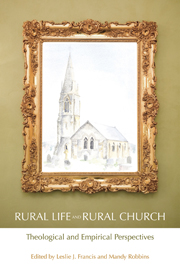Book contents
- Frontmatter
- Contents
- Preface
- Foreword by The Bishop of Shrewsbury, The Rt Revd Mark Rylands
- 1 Introduction: shaping rural theology
- PART 1 PERSPECTIVES FROM THE BIBLE
- PART 2 PERSPECTIVES FROM ORDINARY THEOLOGY
- PART 3 THEOLOGICAL AND SOCIOLOGICAL PERSPECTIVES
- PART 4 HISTORICAL PERSPECTIVES
- PART 5 LISTENING TO VISITORS
- PART 6 LISTENING TO THE COMMUNITY
- PART 7 LISTENING TO CHURCHGOERS
- 21 All types are called, but some are more likely to respond: the Psychological type profile of rural Anglican churchgoers in Wales
- 22 The social significance of Harvest Festivals in the countryside: an empirical enquiry among those who attend
- 23 Psychological type profile of volunteer workers in a rural Christian charity shop
- PART 8 LISTENING TO CHURCH LEADERS
- PART 9 SATISFACTION AND STRESS IN MINISTRY
- Contributors
- Sources
- Subject Index
- Name Index
22 - The social significance of Harvest Festivals in the countryside: an empirical enquiry among those who attend
from PART 7 - LISTENING TO CHURCHGOERS
- Frontmatter
- Contents
- Preface
- Foreword by The Bishop of Shrewsbury, The Rt Revd Mark Rylands
- 1 Introduction: shaping rural theology
- PART 1 PERSPECTIVES FROM THE BIBLE
- PART 2 PERSPECTIVES FROM ORDINARY THEOLOGY
- PART 3 THEOLOGICAL AND SOCIOLOGICAL PERSPECTIVES
- PART 4 HISTORICAL PERSPECTIVES
- PART 5 LISTENING TO VISITORS
- PART 6 LISTENING TO THE COMMUNITY
- PART 7 LISTENING TO CHURCHGOERS
- 21 All types are called, but some are more likely to respond: the Psychological type profile of rural Anglican churchgoers in Wales
- 22 The social significance of Harvest Festivals in the countryside: an empirical enquiry among those who attend
- 23 Psychological type profile of volunteer workers in a rural Christian charity shop
- PART 8 LISTENING TO CHURCH LEADERS
- PART 9 SATISFACTION AND STRESS IN MINISTRY
- Contributors
- Sources
- Subject Index
- Name Index
Summary
Abstract – Many commentators have noted the diversification and fragmentation of village life. The present article draws on the conceptualization proposed by Walker (2006) to distinguish between ten identifiable groups of individuals visible in the rural landscape (including established residents, lifestyle shifters and tourists) and four ways in which individuals may experience or express their belonging to that rural community (through activities, events, people and places). In order to examine the extent to which Harvest Festivals enable rural Anglican churches to contact a broad cross section of the community, data were provided by 1,454 attendees at Harvest Festival services conducted within 27 rural churches in the Diocese of Worcester. The data suggest that, although demographically Harvest Festival and normal Sunday congregations are similar, Harvest services continue to reach out into the varied categories of rural inhabitants and attract significant numbers of non-residents, occasional churchgoers and those who belong by virtue of people, events or place rather than through activity based participation. As such it continues to provide an example of the public role and significance of religious practice in a twenty-first century setting.
Introduction
Many commentators have drawn attention in recent years to the increasing diversity and fragmentation of rural communities. Martineau, Francis and Francis (2004) in particular bring together contributions from a number of authors who cover (inter alia) governance, isolation, dynamics of community and the interplay between private property and public good. As the nature of country life has changed, rural Anglicanism itself has had many challenges to face (as set out in, for example, Francis, 1985, Russell, 1986 and more recently Bowden, 1994).
- Type
- Chapter
- Information
- Rural Life and Rural ChurchTheological and Empirical Perspectives, pp. 266 - 280Publisher: Acumen PublishingPrint publication year: 2012



